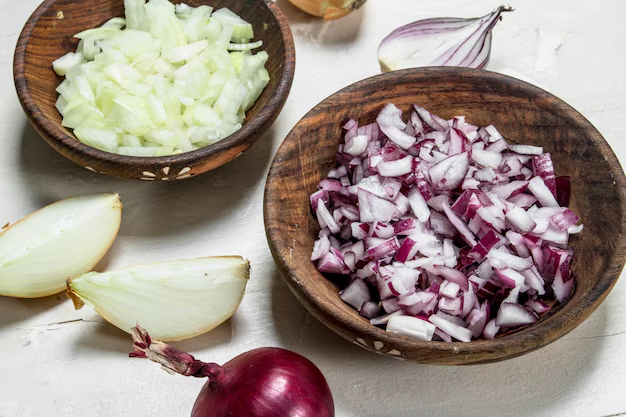Mastering Onion Storage: How Long Can Chopped Onions Last in Your Fridge?
Have you ever opened your refrigerator, excited to prepare a dish, only to find yourself questioning the freshness of those chopped onions lurking in the back? You're not alone. Onions are a kitchen staple, essential in countless recipes, yet there's an ongoing debate about how long they should be kept once chopped. In this guide, we'll explore the optimal ways to store chopped onions, ensuring they remain fresh and flavorful. Whether you're a seasoned chef or a home cook trying to minimize waste, understanding the shelf life of chopped onions can transform your culinary experience.
The Lifespan of Chopped Onions in the Fridge
Keeping Freshness: The General Rule of Thumb
Once onions are chopped, their natural defenses are weakened, and they are more susceptible to spoilage. While whole onions can last in a cool, dry place for several weeks, chopped onions have a much shorter lifespan. Generally, chopped onions stored in the refrigerator can last about 7 to 10 days. This can vary based on storage methods and conditions.
Signs of Spoilage
Recognizing when chopped onions have expired is crucial to ensuring your dishes remain enjoyable and safe. Here are some indicators that chopped onions should be discarded:
- Slimy Texture: A slippery or slimy coating is an indicator of spoilage.
- Foul Odor: A sharp, unpleasant smell different from the onion's natural aroma suggests decomposition.
- Discoloration: Onions that have turned brown or have other noticeable color changes might have gone bad.
Storing chopped onions correctly can enhance their shelf life and prevent these spoilage signs from appearing prematurely.
Best Practices for Storing Chopped Onions
Container Choice: Airtight is Key
Using the right container is essential for prolonging the freshness of chopped onions. Airtight containers or resealable plastic bags help maintain moisture and keep unwanted odors out. This method not only extends the shelf life of onions but also prevents them from imparting their strong aroma to other foods in the fridge.
Temperature Matters
Onions thrive in cool environments. The ideal temperature for storing chopped onions in the fridge is around 32°F to 40°F. This ensures the onions remain at a consistent temperature, minimizing the risk of spoilage.
The Freezing Alternative
If you find yourself with a surplus of chopped onions or want to prepare ahead, freezing is a viable alternative. Here's a quick guide on how to freeze chopped onions:
- Blanching: Quickly blanch chopped onions in boiling water for 3-4 minutes, then transfer them to an ice bath. This process helps preserve the onion’s flavor and texture.
- Flash Freeze: Spread the onions in a single layer on a baking sheet and freeze them for a few hours.
- Store: Once frozen, transfer the onions to an airtight container or freezer bag and return them to the freezer.
Frozen onions can be used directly from the freezer in cooked dishes, although they might not retain the crispy texture needed for raw dishes.
Exploring Related Storage Topics
Storing Whole Onions
While we've focused on chopped onions, understanding how to store whole onions is equally important. Whole onions should be stored in a cool, dry place with plenty of air circulation. A pantry or a basement can be ideal environments. Remember, never refrigerate whole onions, as the moisture can lead to sprouting and spoilage.
What About Other Onion Varieties?
Different onion varieties, such as red, yellow, and sweet onions, have similar storage requirements when chopped. However, sweet onions tend to spoil faster due to their higher sugar content. Therefore, paying closer attention to their condition is advisable.
Substituting for Chopped Onions
In cases where chopped onions have spoiled or aren't available, you could consider using dried onion flakes or onion powder. These alternatives provide a similar flavor profile and have a long shelf life. Keep in mind, fresh is often best for texture and taste, but these substitutes are excellent for emergencies.
Practical Takeaways for Everyday Cooking
Here are some concise, practical tips for storing chopped onions effectively, enhanced with emojis for visual appeal:
- 🥶 Use Airtight Containers: Keeps onions fresh and fridge odor-free.
- 🌡️ Optimal Temperature: Maintain between 32°F to 40°F for best results.
- 🕐 Timing is Key: Aim to use within 7-10 days.
- 🚫 Spot the Signs: Discard onions if slimy, discolored, or foul-smelling.
- ❄️ Freeze for Longevity: Blanch, flash freeze, and store for up to 6 months.
- 🧅 Whole Onion Wisdom: Store in a dry, ventilated area, not in the fridge.
These tips not only help maintain the quality of chopped onions but also protect other food items from absorbing unwanted flavors.
Extending Your Culinary Knowledge
Understanding the nuances of food storage can lead to broader culinary insights. Enhancing your storage techniques for simple ingredients like onions reflects a commitment to better cooking practices and reduces food waste—a win for your kitchen and the environment. By following these strategies, you're equipped to make informed decisions on using, storing, and even preserving onions for longer durations.
While onions are a foundational ingredient in many recipes, their proper storage is often underestimated. Embracing these simple yet effective onion storage techniques ensures that your dishes remain delicious and your kitchen efficient. Whether you're preparing a gourmet meal or a simple snack, understanding how to store onions optimally can make all the difference. So next time you're slicing that onion, remember: a little storage know-how goes a long way.

